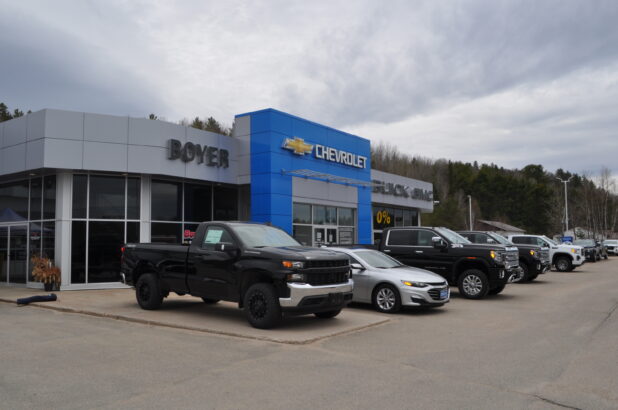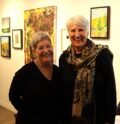Headline News
Auto sales decline with COVID-19
May 21, 2020

May 21, 2020
By Michael Riley
Local Journalism Initiative Reporter
Automotive sales have taken a hit during COVID-19 due to the restrictions on non-essential businesses put in place by the Ontario government. While those restrictions have eased somewhat in the last couple of weeks, automotive dealerships across Canada, and here in Ontario have all felt the severe financial strain. Here in Bancroft, Vance Motors, Paul Price Ford and Boyers Auto Group recount what it has been like and what they’ve been doing to weather the COVID-19 storm.
The Canadian Automotive Dealers’ Association represents the interests of over 3,200 automotive dealers across the country. It painted a stark picture of the toll that COVID-19 had taken on the Canadian automotive industry in a survey and press release they put on their website April 20. The Canadian auto industry contributes $120 billion to the economy every year and employs around 160,000 people. It found that 87 percent of dealerships have seen revenue declines or more than 30 per cent. Their service departments continued as usual for 77 per cent of dealers; however, 40 per cent have experienced a 50 per cent decline or more in service and parts revenue. With regard to staffing, 96 per cent of dealerships had to lay off employees, with 78 per cent of those having to lay off more than 10 workers. While many dealerships had to close or partially close their showrooms, over the last couple of weeks, they have been able to slowly reopen with restrictions in Ontario and Quebec.
“Most dealerships have had to partially or completely shut their doors,” said Tim Reuss, CADA’s president and CEO in this April 20 survey press release, emphasizing the logistical and financial strain that his dealers are under. “On top of that, they’ve implemented additional safety protocols that include increased cleaning and sanitizing, protective barriers and wearing protective gear, all while maintaining reduced hours of operation.”
CADA’s survey also showed the financial supports that dealers need from both levels of government as well as the original equipment manufacturers they deal with, including deferral of property taxes, and the waiving of HST on sales for the next few months. A push from CADA to include their dealers in the Canada Emergency Wage Subsidy has already been successful. The wage subsidy is retroactive to March 15 and will go to June 6. CADA is currently in discussions with the government for more direct support for dealers in the months ahead, including mortgage and commercial rent relief, cutting utility costs and property tax deferrals. In addition, to help dealers operate safely during the pandemic, they released a Health and Safety guide on their website on May 11.
Bob Pierce is the director of member services for the Used Car Dealers Association of Ontario. He says it has been a roller coaster for the past couple of months for his members.
“It had a pretty dramatic effect on sales from talking to our 5,000 dealers across the province. When car sales were taken off the essentials list by the government, there was a bunch of people wanting to know what it meant by remote sales. What can they really do? It was a busy time for the association staff. It’s one thing to say you can do car sales online, but we’re not selling cameras or any of that stuff on Amazon. It’s not like you can just parachute a car into someone’s driveway. There’s a lot of paperwork that needs to be done, signatures and verification of identity and all the rest of that stuff. Which is a whole other issue in our industry, identity theft, when people are buying and leasing and financing cars. From listening to some of our dealers, it went from hero to zero until they got used to doing it differently,” he says.
Pierce said it got so bad initially that a few dealers just closed their doors and went home. But he says in the last month, most of his members have hit their stride and gotten to do a few deals, although not nearly approaching pre COVID-19 numbers. Obviously, with so many people losing their jobs and going through financial hardships throughout lockdown, there aren’t as many people financially ready to make a big purchase like a new car. A lot of the time, they will only do it because their current car has completely stopped working — and even then they often need bad credit auto loans Lynchburg in order to afford it.
“In that first month of the past two months, if a dealer was doing 20 cars a week, they were now doing three cars. By last month, they were doing about six cars. It’s a lot more difficult when you don’t have people walking around on a Saturday. They get up in the morning and say ‘I want to buy a car’ so they search three or four dealers, Bancroft’s a nice area, so they can hit all the major dealers up there in a day perhaps. Now, you’re looking online and talking on the phone. I don’t know how easily you’re going to part with $50,000 over the internet. You, as a buyer want to sit in the car, look at it, look in the backseat, you want to kick the tires if it’s used. Used is probably a little easier because you’re generally parting with less money. But even a new car you still want to sit in it, sit down and talk about some numbers, if you’re interested in extra warranties and you want to have those conversations before you put down your money. It’s a lot more difficult to do that over the phone or over the internet,” he says.
Pierce says it is doable of course and he’s seen his members turn things around during the last month. Since last week, they have also been able to conduct business by appointment only, which he says as an industry they’re used to, so it’s been OK.
He also points out what he calls a need factor for customers in the auto industry.
“There’s 12 to 13 million cars on the road in Ontario, with one million coming off the road every year. It’s not that people are saying they want a new car or truck, they actually need it because their old one died, and they need to get someplace in rural Ontario. You can’t take the subway to work! So, if you need a car you get a car and I don’t think COVID-19 has stopped anything in that regard. Sales have been pretty strong the past couple of years, and I think it will come back. If dealers make it through this, I’m fairly optimistic that the sales will recover,” he says.
Matthew Sauter, sales manager at Vance Motors says that for a good five or six weeks, their doors were locked completely.
“I was answering online inquiries from home, but we had to lay off six of our sales staff, including our digital marketing guy. So that was tough. We’ve really only been back open now for just over two weeks, one week by appointment and the previous week with online sales. It had a huge impact on us. We ran for five weeks with only one service technician and myself. We couldn’t sell anything at that point. It was just keeping in touch with our customers just so they knew we hadn’t shut our doors forever,” he says.
Sauter says there was a lot of support from the community, and that they actually closed their doors a few days ahead of the government order. He says they got a lot of positive feedback saying they were doing the right thing under the circumstances.
“At this point, we’re fully open in the sense that we can do anything you need us to do. Seeing or test driving a vehicle is done by appointment now at this point. A lot of customers are still choosing to shop online and not have any interaction in the dealership, which has been really successful for us. We’re running about half our sales staff just because it’s very manageable, everything’s done by appointment and we don’t have that walk-in traffic. We’ve taken every precaution however; we’ve got plexiglass up in the offices, social distancing marks on the floor, we’re disinfecting everything that we can, doorknobs, key fobs before and after every test drive. There’s certainly a longer process involved. We’ve got all our detailing staff back because they’re busy with all the extra precautions needed,” he says.
Paul Price Ford salesman Brad MacDonald says that sales have been down but not as much as he had feared.
“It’s not too bad, and service is good workwise, it hasn’t affected them at all. They’ve been as busy as they’ve ever been. We’re now generally doing sales by appointment as mandated, but it hasn’t changed that much. Before COVID-19, people would usually call and say that they were coming in. Now everyone has to call and book a specific time. But other than that, just the regular distancing stuff and always having lots of sanitizer available for people and stuff like that,” he says.
MacDonald says they were closed for about two weeks in late March/early April, and that as a salesperson, he was laid off for about six weeks. He and all the other sales staff are now back at work. The service staff were laid off for two weeks when they were fully closed, but have been back at work ever since.
He says that the public reaction to the closure and the restrictions has been that of understanding.
“Everyone had to do it. I was keeping in touch with my boss [Rob Price] while I was at home, and he was just here by himself for the first two weeks answering the phone, and he said there wasn’t a lot of traffic, not a lot of people calling. At the beginning of this people were a lot more scared and now they’re working their way around it. But they’ve been pretty understanding, nobody’s gotten too wound up about it,” he says.
Ryan Courtney is the general manager at Boyer Chevrolet Buick GMC and says it was challenging at first because they had to cut back from 28 employees to 11, and it was hard doing all they needed to do with that reduced staffing level.
“We just wanted to ensure that the service staff could come in and work and feel comfortable every day. We service all the police, fire and ambulance vehicles in Bancroft, so closing wasn’t an option for us. We lost money by being open but in a rural area it’s unfathomable to leave people high and dry. If you have an emergency, have to get to the hospital, or get to a family member, you need your vehicle.
He says he’s really proud of his staff that came in and worked under such challenging conditions.
“I’m very impressed at how hard they worked, not one sick day. The whole time they’ve been on time, with a positive attitude. It’s a time of depression and anxiety and people are not happy fixing their cars when they break down. My staff see the brunt of that and people get angry and want to vent to anyone. I watch them take the brunt of that and they handle it with grace and care, being understaffed too. They know the customer is going through a hard time. I’ve got a great team. If you ever want to know if you have the right staff go through a pandemic. There’s no question I have the best employees in Bancroft,” he says.
Courtney says they, like other dealers now, are taking people by appointment only, one person per appointment. They also have their EZ Buy at Boyer program for customers to shop online, do the transaction remotely and have the vehicle delivered to their door. They’re also following stringent health and safety protocols, like constant physical distancing and wiping down high impact surfaces in and out of the vehicles with Lysol wipes. He says these procedures aren’t difficult to do, just time consuming.
He says Bancroft is such a great community and has shown such love and support to his dealership and each other during this pandemic.
“We were also lucky with some subsidies to help our pay [the Canada Emergency Wage Subsidy], without that we’d be hemorrhaging. We’re also lucky to be working for the Boyers, who are financially strong and responsible. They prepared well for downturns in the economy like this,” he says.
While 99 per cent of people he’s seen are understanding of the restrictions, there is a small number who don’t believe it’s a threat, according to Courtney. He says they have and will turn away people who don’t adhere to their guidelines, even at the risk of angering them or getting online criticisms.
“I don’t care, because it comes down to my staff safety and that of the other customers. It’s just part of life. It’s just a matter of doing our best job so the customer knows we’re here to help them. We do make money in the good times, not now, but the ultimate thing is customer satisfaction,” he says. “We just want Bancroft and area people to know we care more about them and their vehicles than anything else.”

















